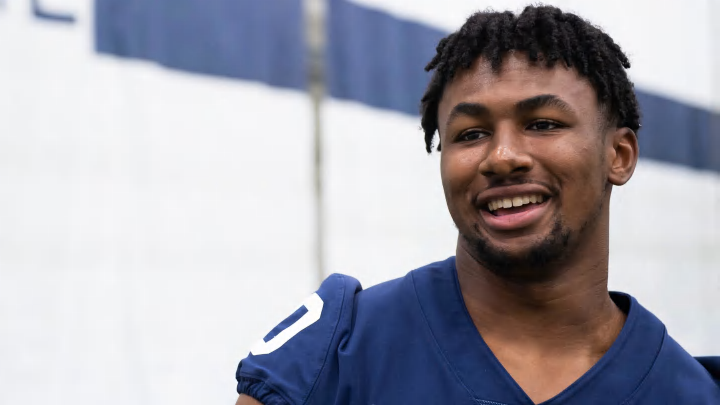Penn State Trains a New Skill on Offense: Public Speaking

Penn State offensive coordinator Andy Kotelnicki brought a big offensive syllabus from Kansas to State College, which the Nittany Lions seem to love. They're energized by his scheme, intrigued at the formations and motions he deploys and eager to unveil all the creative looks of Kotelnicki's offense.
But while learning a host of hard skills on the field, Penn State's offensive players are diving into a soft skill off it: public speaking. Kotelnicki is putting the Nittany Lions in some potentially uncomfortable positions to praise, and critique, their teammates in front of the entire offense. It's a key part of Kotelnicki's approach to building offensive leadership by giving his players a voice and a stake in their offense.
"That's been the best thing that we've done as an offense," quarterback Drew Allar said.
The concept is simple, but the actions can be quite difficult. After every practice, Kotelnicki and his offensive staff pick one player to address the entire offense about what the group did well and where it slacked. They do so by describing a series of plays or reps that the coaches have clipped from practice. Some clips are good, others aren't.
Kotelnicki has names for the different sets of clips. One is the "We are" tape, the other is called "We are not."
"You definitely don't want to be on that 'We are not' tape, that's for sure," center and captain Nick Dawkins said.
Kotelnicki employed the practice at other programs where he coached, including Kansas, as a leadership-development tool, largely to help players develop their voices and get comfortable with public speaking. He introduced it at Penn State during spring practice, and the "We are/We are not" film construction proved a natural fit.
Kotelnicki said the exercise impacts players on multiple levels. First, it introduces them not only to speaking in public but also to being thoughtfully critical. Second, it refocuses corrective measures from the coaches' perspective toward the players. Third, it turns players into stakeholders in the offense.
"We all remember being young and we all remember not being able to stand in front of a roomful of people, even among your peers, and say things," Kotelnicki said. "... What I’ve learned about developing leaders is, you need to empower them. Giving them a voice, or making them use a voice, is one of the first things."
Players say the public-speaking exercise has made a difference. Dawkins, one of the team's most engaging personalities, still isn't that comfortable with public speaking. These sessions helped him confront that. He also said that Allar is a "natural," guard Vega Ioane brings a personal conviction because he "cares deeply" and running back Nicholas Singleton has emerged from his quiet side to "grow that part of his personality."
"It gives guys a platform to speak in front of their peers," quarterback Beau Pribula said. "It helps with leadership roles and helps guys speak publicly in front of [their teammates] and get comfortable with that. The other thing is, it kind of calls guys out in the right way. If you're on the field one day and are like, 'Oh, man, it's hot, I'm going to take this rep off,' you don't. Because you don't want to be on that 'We are not' tape."
Receiver Julian Fleming, who spent four years at Ohio State, said he had not participated in anything like this until joining Penn State's offense over the winter. He has found the exercise to be a positive bonding tool.
"It's my first time in a situation like this, and honestly I think it's really, really cool," Fleming said. "Peer pressure is one of the best pressures."
Allar seems to be the most enthusiastic about the exercise. "I'm always going to be a lead-by-example guy," he said. "That's just kind of how I'm wired." But getting in front of teammates to tell them what they're doing right and wrong has helped train his vocal side. Recently, teammates voted Allar one of their six captains.
"It's definitely a skill you have to practice and work on," Allar said of public speaking. "It's being comfortable with just being vulnerable and [having] open discussions and talking more in front of a bigger crowd of your peers and teammates. It's telling them what needs to be said even if it's something you don't want to say. That's been the best thing that we've done as an offense. I can definitely feel there's more presence of leadership and vocal leadership."
More Penn State Football
James Franklin has a history of harrowing road openers at Penn State
For Nittany Lions receiver Harrison Wallace III, "it's time"
Penn State lands at No. 8 in ESPN's preseason power rankings
Penn State on SI is the place for Penn State news, opinion and perspective on the SI.com network. Publisher Mark Wogenrich has covered Penn State for more than 20 years, tracking three coaching staffs, three Big Ten titles and a catalog of great stories. Follow him on X (or Twitter) @MarkWogenrich.
